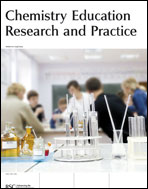A comparative study of traditional, inquiry-based, and research-based laboratory curricula: impacts on understanding of the nature of science
Abstract
We explored the impact of laboratory curriculum on students' understanding of the nature of science at five US universities. The specific curricula studied were traditional (verification), inquiry-based, and research-based. The inquiry curriculum was Inquiries into Chemistry, and the research-based curriculum was developed by the Center for Authentic Science Practice in Education (CASPiE). Our findings suggest that laboratory curriculum is a strong factor in the development of students' discussions of theories and their conceptions of creativity in science. Students in the research-based laboratory curriculum demonstrated the most gains as a result of their laboratory when compared to their counterparts in the traditional and inquiry-based laboratories.

 Please wait while we load your content...
Please wait while we load your content...